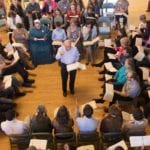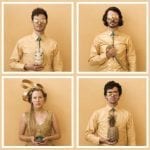William Pilgrim: Live at the Ice House with The Blind Boys of Alabama
The podcast, Live at the Ice House with William Pilgrim and the All Grows up is a living document of the growth of two artists from the streets of L.A. and Orange County to the recording studios of Hollywood where in the latest episode with they are joined by The Blind Boys of Alabama including Jimmy Carter-the oldest touring member of the group. The broadcast also brings together social commentator, writer and activist, Kevin Alexander Gray, modern artist-poet, David (Judah 1) Oliver and up and coming singer-songwriter, Josh (Lesedi Lo-Fi) Douglas. Also featured is narrator Exene Cervenka, legendary poet, writer, activist and musician. She is one of the founding members of L.A.’s own seminal punk band, X. The episode is a well-paced production directed by photographer, Scott Montgomery.
The duo, William Pilgrim and The All Grows Up, are PM Romero; a seasoned musician and songwriter in his early 40’s, and gifted writer and vocalist, 28 year-old Ishmael “Ish” Herring. They are no homogenized, postured or blandly calculated folk duo marketed by a saavy publicity agency to just the right demographic soon to appear on NPR. No such plan can be detected here. Rather, like many of the best blues, folk, country and jazz musicians of the last century, the sound that has grown from their partnership comes from the hard ground of personal life experience over the last ten years. As their first release, The Great Recession, demonstrates, their music is not bred in corporate studios or sponsored showcases. Rather, it is from the homeless streets of today’s often disenfranchised youth and overlooked veterans of the music industry. It is a new gathering, a new vision that shakes up the status quo. What they are doing stands in contrast to the angry, cynical punk and rap scenes of the past that tend to spiral down into hypocrisy and self-destruction or commercial compromise and mediocrity. William Pilgrim is filled to the brim with the joy and passion of song. Their music is the dance that carries a clear underlying gospel feel and results in hope and the kind of change that can save the world, as Exene Cervenka eludes to in episode 4.


In 2011 when the Occupy Movement first emerged, Romero began writing songs that spoke to the concerns of that population. The songs became a vehicle for the sense of mission and change he felt there. When he answered homeless youth, Ishmael Herring’s ad, the project took on a higher purpose.
The purpose was a movement of true gospel music and message. The gospel they created came from their own inner-light and shined out from every word and note of the songs they recorded. The focus of the Live at the Ice House episodes has been about teen homelessness and what they found on the streets are diamonds in the ashes of “discarded” people. What Phil and Ish have done is the truest form of alchemy.
The “Rock & Role Models-Episode 4” of Live at The Ice House, 


As the episode draws to a close, the gap between young and old and all of the questions raised fall to the wayside – to the sound of four blind singers from Alabama who have been performing since 1939 spreading the gospel of peace through music.
And the journey continues for William Pilgrim and the All Grows Up.
All photo credit to Scott Montgomery
this article originally appeared in FolkWorks





